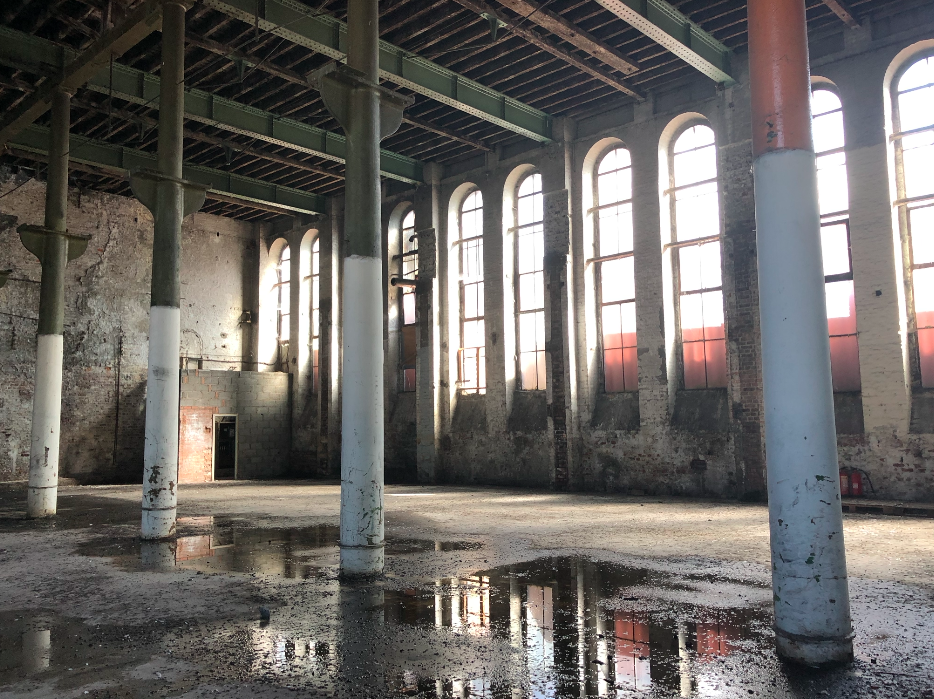7 February 2022
| | 2 min readFull steam ahead to a digital revolution
A derelict building on Tyneside that was once at the heart of the industrial revolution is set for a new lease of life helping create the next generation of jobs.

The Pattern Shop, behind Newcastle Central Station, was where industrial pioneer Robert Stephenson built steam locomotives in the 1800s for export around the world heralding the birth of the railway.
Founded in 1823, Robert Stephenson and Company, was the first company in the world created specifically to build railway engines.
After Stephenson moved out of the Pattern Shop, the Grade II Listed building went on to become a builder’s yard before eventually being abandoned in the 1960s.
Now planners have given permission for the two-storey workshop in a conservation area to be transformed into an eco-friendly commercial centre, housing small and medium sized businesses in the creative and digital sectors.
It is hoped up to 300 people will eventually occupy the low carbon, low energy building which will offer more than 3,000 square metres of flexible workspace with southerly views across the River Tyne.
Situated between Sussex Street and South Street, off Forth Street, on the 4.3-acre brownfield Stephenson Quarter site, the plot is the first to be developed in Stephenson Works LLP, a joint venture between Newcastle City Council (owners of the building) and developer PfP-igloo, a business formed with investment from Places for People Group through its fund management business, PfP Capital.
Cabinet Member for Development Neighbourhoods and Transport, Cllr Ged Bell, said: “It’s an incredibly important building from a historical point of view being at the forefront of the industrial revolution.
“Robert Stephenson fitted out engines there – 3,000 were shipped all over the world as far afield as America and Egypt putting Newcastle on the international map.
“I am delighted that the building will be brought back into use, hopefully to house new businesses that will put Newcastle on the map again for new hi-tech inventions and digital applications.”
John Tatham, Director at PfP-igloo, said: “The Pattern Shop is one of the city’s stunning hidden gems and a great example of how working with Newcastle City Council, we can deliver a range of real benefits; the restoration of such an important part of Newcastle’s heritage; measures to reduce carbon and a unique space to attract businesses and create employment. Once occupied next year, it will really help to establish the historic heart of the site.”
The total £8.7m cost of the refurbishment will be met by a £0.8m Local Growth Fund grant from the North East Local Enterprise Partnership, a £1.4m grant from the Government’s Public Sector Decarbonisation Scheme, with the balance of funding coming from the Joint Venture partners. The LEP grant will fund the repair of the structure and roof of the building, with the PSDS grant funding a variety of energy saving measures that will reduce its carbon footprint.
The project will be fully completed in Summer 2022.
Andrew Moffat CBE, Chair of the North East LEP Investment Board, said: “The continued redevelopment of the Stephenson Quarter is breathing new life into one of Newcastle’s most culturally significant areas.
“Part of the birthplace of the industrial revolution, the Stephenson Quarter will now be home to the next generation of innovation businesses, supporting further growth of the North East’s creative and digital sectors.”
Gateshead-based contractor Tolent was awarded the £1.1m enabling works contract for undertaking the first phase of restoration works to the building.
Specialist teams are undertaking a series of works to bring it back into use including a deep clean, shot blasting steelwork, asbestos removal and repair works to the roof and replacement of the existing timber floors.
This is going to be followed by a further contract to complete the conversion of the building to modern offices, whilst retaining the buildings heritage features and unique history.
David Thompson, Divisional Managing Director for Tolent, said: "This is a really interesting project for us, and we are delighted to be involved in such a unique development."
“Working on any site with listed building status requires a team that are experienced and highly skilled to carry out what can be quite a delicate sequence of work, so it's great to see our team delivering this quality service for the council."
The Pattern Shop is the first of seven remaining plots on Stephenson Quarter that will be developed over the next seven years by a partnership between the city council and PfP-igloo.
PfP-igloo is a business formed with investment from Places for People Group through its fund management business, PfP Capital.
If you would like to give us feedback on our website, please complete this short online form.




